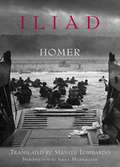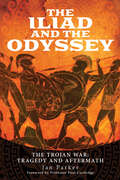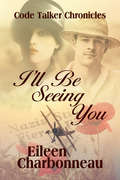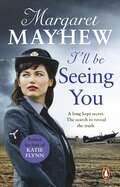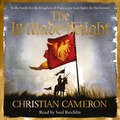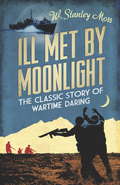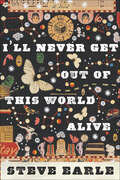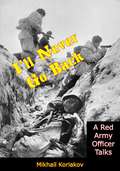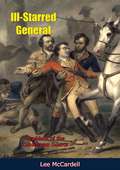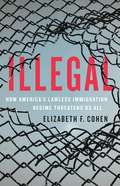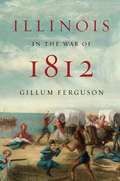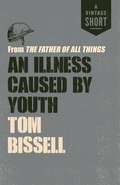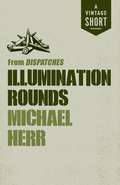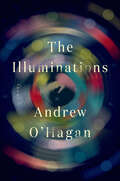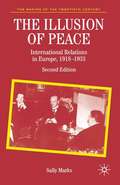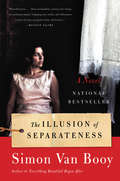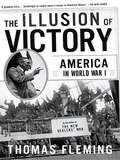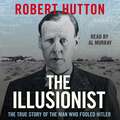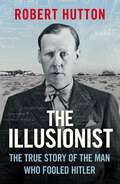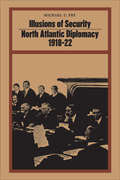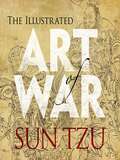- Table View
- List View
The Iliad
by Stanley Lombardo HomerThe Iliad is the story of a raging anger and its human toll. The poem recounts "the rage of Achilles," the greatest of the Greek heroes fighting in the war against Troy. The Iliad draws us into a world of warrior aristocrats for whom honor, gained and regained in the front lines of battle, is paramount.
The Iliad and the Odyssey: The Trojan War: Tragedy and Aftermath
by Jan ParkerThe Iliad dealing with the final stages of the Trojan War and The Odyssey with return and aftermath were central to the Classical Greeks' self identity and world view. Epic poems attributed to Homer, they underpinned ideas about heroism, masculinity and identity; about glory, sacrifice and the pity of war; about what makes life worth living. From Achilles, Patroclus and Agamemnon in the Greek camp, Hektor, Paris and Helen in Troy's citadel, the drama of the battlefield and the gods looking on, to Odysseus' adventures and vengeful return - Jan Parker here offers the ideal companion to exploring key events, characters and major themes. A book-by-book synopsis and commentary discuss the heroes' relationships, values and psychology and the narratives' shimmering presentation of war, its victims and the challenges of return and reintegration. Essays set the epics in their historical context and trace the key terms; the 'Journey Home from War' continues with 'Afterstories' of both heroes and their women. Whether you've always wanted to go deeper into these extraordinary works or are coming to them for the first time, The Iliad and the Odyssey: The Trojan War, Tragedy and Aftermath will help you understand and enjoy Homer's monumentally important work.
I'll Be Home For Christmas
by Jessica Scott"Jessica Scott should be on every reader's list." --Brenda Novak, New York Times Bestselling Author I'LL BE HOME FOR CHRISTMASThere's nothing in the world Army Sergeant Vic Carponti loves more than his wife and his country. Smart-mouthed and easy tempered, he takes everything as a joke . . . except his promise to come home to his wife, Nicole, for Christmas. As he prepares to leave for his latest deployment into Iraq, Vic will do everything he can to shield his beautiful, supportive wife from the realities of war . . . and from his own darkest fears.As a career army wife, Nicole Carponti knows just what to expect from her husband's tour of duty: loneliness, relentless worry, and a seemingly endless countdown until the moment Vic walks through the door again. But when the unthinkable happens, Nicole and Vic's bond is tested like never before and changes everything they believe to be true about the power of love and the simple beauty of being home for the holidays.(25,000 words)
I'll Be Seeing You: Code Talker Chronicles (Code Talker Chronicles #1)
by Eileen CharbonneauLuke Kayenta and his childhood friend Nantai Riggs are young shepherds of the Navajo reservation in Arizona. They volunteer for an experiment: to come up with an uncrackable code based on their language to be used by the US as it enters World War II. They fly into New York to join the spy agency the Office of Strategic Services (OSS). While on the airfield, Luke catches sight of a young woman. He is first enchanted, then heartsick when he finds that Kitty Charante is the devoted wife of his Canadian RAF pilot and instructor in espionage. Their paths will cross again.
I'll Be Seeing You: A spellbinding and emotional wartime novel of love and secrets
by Margaret MayhewAn enthralling novel of love and secrets from the Second World War, perfect for fans of Katie Flynn and Fiona Valpy.READERS ARE LOVING I'LL BE SEEING YOU!"I consider Margaret Mayhew to be an exceptional author and this is one of her best offerings!" - 5 STARS"Exceptional story kept me enthralled until the end. I loved the way this book was written." - 5 STARS"This is the first book I have read by Margaret Meyhew. It won't be the last." - 5 STARS"Absolutely loved this story, so much so I just stayed up all night reading it , desperate to see how it unfolded, yet hating seeing it come to an end. So well written and researched." - 5 STARS*********************************WHAT IF EVERYTHING YOU BELIEVED TURNED OUT TO BE A LIE?1992: When Juliet Porter's mother dies, she leaves her some old letters and a photograph which shatter everything Juliet thought she knew about her upbringing. Discovering her real father was an American bomber pilot who met her mother while serving in England during the Second World War, she sets out to trace him...1944: Daisy, Juliet's mother, is in the WAAF and plans to marry the American bomber pilot she has fallen deeply in love with once his tour is over. But one day he is shot down over France and posted missing, presumed dead. Pregnant and grieving, she marries Vernon - a long term admirer - only to discover at the end of the war that her pilot has survived...
I'll Be Your Sweetheart: A heart-warming saga of mothers, daughters and best friends (Molly and Nellie series, Book 8)
by Joan JonkerWhile Molly and Nellie play detective, for Molly's youngest, there's also a party to plan and a boy to impress... Joan Jonker brings us another instalment of her hugely popular Molly and Nellie series in I'll Be Your Sweetheart, as the two friends get up to more mischief in their beloved Liverpool. Perfect for fans of Katie Flynn and Anne Baker. Not a day goes by without Molly Bennett and Nellie McDonough counting their blessings. But when an elderly neighbour, Flora Parker, is robbed of her most treasured possession, and left without a penny to her name, the two friends jump at the chance of setting their detecting skills in motion. Meanwhile, Molly's youngest daughter, Ruthie, and her best friend, Bella, are making plans for their joint sixteenth birthday party. Ruthie is determined to look glamorous, a real knock out, to catch the eye of a certain boy for whom she's got more than a soft spot. What readers are saying about I'll Be Your Sweetheart: 'This is another excellent read from Joan Jonker. We are back with her most popular characters Molly and Nellie, and as usual, you feel right at the centre of the action. Once again Molly and Nellie are called on to help a neighbour and there's lots of fun and laughter before things reach the feel-good conclusion I've come to expect from Joan. First class as usual!'
The Ill-Made Knight: ‘The master of historical fiction’ SUNDAY TIMES (Chivalry #1)
by Christian Cameron'Brilliantly evoked' SUNDAY TIMESDiscover the first medieval adventure in the action-packed Chivalry series! Perfect for fans of Bernard Cornwell, Simon Scarrow and Conn Iggulden.September, 1356. Poitiers. The greatest knights of the age were ready to give battle.On the English side, Edward, the Black Prince, who'd earned his spurs at Crecy.On the French side, the King and his son, the Dauphin. With 12,000 knights. And then there is William Gold. A cook's boy - the lowest of the low - who had once been branded as a thief. William dreams of being a knight, but in this savage new world of intrigue, betrayal and greed, first he must learn to survive. As rapacious English mercenaries plunder a country already ravaged by plague, and the peasantry take violent revenge against the French knights who have failed to protect them, is chivalry any more than a boyish fantasy?'A sword-slash above the rest' IRISH EXAMINER'One of the finest writers of historical fiction in the world' BEN KANE
Ill Met By Moonlight
by W. Stanley MossNOW WITH AN INTRODUCTION BY W. STANLEY MOSS'S DAUGHTER GABRIELLA BULLOCK AND AN AFTERWORD BY PATRICK LEIGH FERMORIll Met By Moonlight is the true story of one of the most hazardous missions of the Second World War. W. Stanley Moss is a young British officer who, along with Major Patrick Leigh Fermor, sets out in Nazi-occupied Crete to kidnap General Kreipe, Commander of the Sevastopool Division, and narrowly escaping the German manhunt, bring him off the island - a vital prisoner for British intelligence.As an account of derring-do and wartime adventure, made into a classic film starring Dirk Bogarde, Ill Met By Moonlight is one of the most brilliantly written, exciting and compelling stories to come out of the Second World War.
Ill Met By Moonlight (Cassell Military Paperbacks Ser.)
by W. Stanley MossNOW WITH AN INTRODUCTION BY W. STANLEY MOSS'S DAUGHTER GABRIELLA BULLOCK AND AN AFTERWORD BY PATRICK LEIGH FERMORIll Met By Moonlight is the true story of one of the most hazardous missions of the Second World War. W. Stanley Moss is a young British officer who, along with Major Patrick Leigh Fermor, sets out in Nazi-occupied Crete to kidnap General Kreipe, Commander of the Sevastopool Division, and narrowly escaping the German manhunt, bring him off the island - a vital prisoner for British intelligence.As an account of derring-do and wartime adventure, made into a classic film starring Dirk Bogarde, Ill Met By Moonlight is one of the most brilliantly written, exciting and compelling stories to come out of the Second World War.
I'll Never Get Out Of This World Alive: A Novel
by Steve EarleDoc Ebersole lives with the ghost of Hank Williams—not just in the figurative sense, not just because he was one of the last people to see him alive, and not just because he is rumored to have given Hank the final morphine dose that killed him. In 1963, ten years after Hank's death, Doc himself is wracked by addiction. Having lost his license to practice medicine, his morphine habit isn't as easy to support as it used to be. So he lives in a rented room in the red-light district on the south side of San Antonio, performing abortions and patching up the odd knife or gunshot wound. But when Graciela, a young Mexican immigrant, appears in the neighborhood in search of Doc's services, miraculous things begin to happen. Graciela sustains a wound on her wrist that never heals, yet she heals others with the touch of her hand. Everyone she meets is transformed for the better, except, maybe, for Hank's angry ghost—who isn't at all pleased to see Doc doing well. A brilliant excavation of an obscure piece of music history, Steve Earle's I'll Never Get Out of This World Alive is also a marvelous novel in its own right, a ballad of regret and redemption, and of the ways in which we remake ourselves and our world through the smallest of miracles.
I’ll Never Go Back: A Red Army Officer Talks
by Mikhail Koriakov Nicholas WredenIn the spring of 1944, Red Army Air Force military correspondent Mikhail Koriakov experienced a profound religious awakening which led to a sudden marked revulsion in his entire opinion of the Soviet system and philosophy. On voicing his new views, he was regarded to be “ideologically unsound,” was relieved of his post, and assigned to innocuous duties.I’ll Never Go Back, first published in 1948, details the author’s adventures following his conversion. The book provides a starkly realistic account of the brutality of the Red Army, detailing various incidents of barbarisms to which he was witness, and also describes his assignment to the Embassy and the operations of the Soviet secret police (NKVD) in Paris during this period.“…compelling…”—Kirkus Review
Ill-Starred General: Braddock of the Coldstream Guards
by Lee McCardellA rare combination of documented fact and good storytelling, Ill-Starred General is the biography of a much maligned man from one of history’s most vital eras. The career of Edward Braddock began during the court intrigues of Queen Anne and George I, gained momentum in continental military campaigns in the early 1750s, and ended abruptly in the rout of his American army near present-day Pittsburgh in 1755. This highly acclaimed biography reveals the man—and the politics—behind his defeat, one of the major setbacks to British imperial power in the American colonies.“Braddock was the first English general that Americans had ever seen in action, and although he lost his life fighting for them, they detested him...What [McCardell] has done is to replace a historical puppet with a credible human being, and...to explain how a carefully planned colonial expedition can go wrong.”—Naomi Bliven, The New Yorker“The breadth, depth and care of McCardell’s research on Ill-Starred General are amazing and delightful. He has labored with that fidelity which every honest historian must display and with that luck which crowns the efforts of the fortunate.”—George Swetnam, Pittsburgh Press“A first-rate biography.”—Lynn Montross, New York Times“A genial and readable interpretation that will revivify an important figure in early American history. It is the kind of well-documented book that will appeal to both the general reader and the historian.”—W. R. Jacobs, American Historical Review
An Ill Wind (Security Specialists International #5)
by Monette MichaelsA damaged woman fleeing her past. After being stalked then attacked by a colleague, Dr. Fiona Teague flees to a New Mexico border town. Working in a clinic, Fee endeavors to overcome the horror of that night. To her dismay, Trey Maddox, her brother’s friend, refuses to be deterred from pursuing a relationship with her. If only she weren’t so broken … Trey’s everything a woman could want—honorable, strong, heroic, but he deserves better than a damaged woman. A strong, capable protector determined to lure her into the shelter of his arms. During an Idaho blizzard, SSI operative Trey Maddox met Fee over the barrel of a rifle as she protected his pregnant sister-in-law. The gutsy little doc then ignored her own physical injuries to deliver his nephew. How could Trey not fall for her? Before he could persuade her to stay in Idaho, she’d cut and run to New Mexico. Undeterred by the distance, he pursues her, eroding her resistance with patience and tenacious good humor. And, finally, she agrees to an actual “date.” But the ill wind that had destroyed her once before now sweeps through Fee’s life again. She’s kidnapped by a drug cartel. Trey arrives to find her house a bloody crime scene. The cartel has no idea of the ruthless hunter they’ve unleashed. Trey will storm hell itself in order to rescue Fee and make her his, once and for all.
Illegal: How America's Lawless Immigration Regime Threatens Us All
by Elizabeth F. CohenA political scientist explains how the American immigration system ran off the rails -- and proposes a bold plan for reform Under the Trump administration, US immigration agencies terrorize the undocumented, target people who are here legally, and even threaten the constitutional rights of American citizens. How did we get to this point? In Illegal, Elizabeth F. Cohen reveals that our current crisis has roots in early twentieth century white nationalist politics, which began to reemerge in the 1980s. Since then, ICE and CBP have acquired bigger budgets and more power than any other law enforcement agency. Now, Trump has unleashed them. If we want to reverse the rising tide of abuse, Cohen argues that we must act quickly to rein in the powers of the current immigration regime and revive saner approaches based on existing law. Going beyond the headlines, Illegal makes clear that if we don't act now all of us, citizen and not, are at risk.
Illinois in the War of 1812
by Gillum FergusonRussell P. Strange "Book of the Year" Award from the Illinois State Historical Society, 2012. On the eve of the War of 1812, the Illinois Territory was a new land of bright promise. Split off from Indiana Territory in 1809, the new territory ran from the junction of the Ohio and Mississippi rivers north to the U.S. border with Canada, embracing the current states of Illinois, Wisconsin, and a part of Michigan. The extreme southern part of the region was rich in timber, but the dominant feature of the landscape was the vast tall grass prairie that stretched without major interruption from Lake Michigan for more than three hundred miles to the south. The territory was largely inhabited by Indians: Sauk, Potawatomi, Kickapoo, and others. By 1812, however, pioneer farmers had gathered in the wooded fringes around prime agricultural land, looking out over the prairies with longing and trepidation. Six years later, a populous Illinois was confident enough to seek and receive admission as a state in the Union. What had intervened was the War of 1812, in which white settlers faced both Indians resistant to their encroachments and British forces poised to seize control of the upper Mississippi and Great Lakes. The war ultimately broke the power and morale of the Indian tribes and deprived them of the support of their ally, Great Britain. Sometimes led by skillful tacticians, at other times by blundering looters who got lost in the tall grass, the combatants showed each other little mercy. Until and even after the war was concluded by the Treaty of Ghent in 1814, there were massacres by both sides, laying the groundwork for later betrayal of friendly and hostile tribes alike and for ultimate expulsion of the Indians from the new state of Illinois. In this engrossing new history, published upon the war's bicentennial, Gillum Ferguson underlines the crucial importance of the War of 1812 in the development of Illinois as a state. The history of Illinois in the War of 1812 has never before been told with so much attention to the personalities who fought it, the events that defined it, and its lasting consequences. Endorsed by the Illinois Society of the War of 1812 and the Illinois War of 1812 Bicentennial Commission.
An Illness Caused by Youth: from The Father of All Things
by Tom BissellVeteran Jack Bissell only deepened the abyss between him and his son Tom when he talked about the Vietnam war. But, when a magazine editor sends the two back to Vietnam for a story, Tom reopens the conversation and confronts his father’s past and the man that had seemed impossibly remote. Part history, memoir, and travelogue, Tom Bissell’s is a haunting, riveting exploration of the war’s personal, political, and cultural impact from the perspective of the generation that grew up in the wake of the conflict and a wise reckoning of the bond forged between fathers and sons. A Vintage Shorts Vietnam Selection. An ebook short.
Illumination Rounds: from Dispatches
by Michael HerrFresh in his boots and three days in-country, Michael Herr is in a Chinook when a young soldier across from him is gunned. “It took me a month to lose that feeling of being a spectator to something that was part game, part show.” Written in unforgettable and unflinching detail, Herr captures the chaos and fervor of the war and the surreal insanity of life in that singular combat zone. Selected from Dispatches, one of "the best book to have been written about the Vietnam War" (The New York Times Book Review) and an instant classic straight from the front lines.A Vintage Shorts Vietnam Selection. An ebook short.
The Illuminations: A Novel
by Andrew O'HaganLonglisted for the 2015 Man Booker PrizeThe Illuminations, the fifth novel from Andrew O'Hagan, a writer "of astonishingly assured gifts" (The New York Times Book Review), is a work of deeply charged beauty--and one that demonstrates, with poignancy and power, that no matter how we look at it, there is no such thing as an ordinary life. Anne Quirk's life is built on stories--the lies she was told by the man she loved and the fictions she told herself to survive. Nobody remembers Anne now, but in her youth she was an artistic pioneer, a creator of groundbreaking documentary photographs. Her beloved grandson Luke, a captain with the Royal West Fusiliers in the British army, has inherited her habit of transforming reality. When his mission in Afghanistan goes horribly wrong, he returns to Scotland, where the secrets that have shaped his family begin to emerge. He and Anne set out to confront a mystery from her past among the Blackpool Illuminations--the dazzling lights that brighten the seaside town as the season turns to winter.
The Illusion of Peace: International Relations in Europe, 1918–1933 (Making Of The Twentieth Century Ser.)
by Sally MarksSally Marks provides a compelling analysis of European diplomacy between the First World War and Hitler's advent. She explores in clear and lively prose the reasons why successive efforts failed to create a lasting peace in the interwar era. Building on the theories of the first edition - many of which have become widely accepted since its publication in 1976 - Marks reassesses Europe's leaders of the period, and the policies of the powers between 1918 and 1933, and beyond. Strongly interpretative and archivally based, The Illusion of Peace examines the emotional, ethnic, and economic factors responsible for international instability, as well as the distortion of the balance of power, the abnormal position of the Soviet Union, the weakness of France and the uncertainty of her relationship with Britain, and the inadequacy of the League of Nations. In so doing, the study clarifies the complex topics of reparations and war debts and challenges traditional assumptions, concluding that widespread western devotion to disarmament and dedication to peace were two of several reasons why democratic statesmen could not respond decisively to Hitler's threat. In this new edition Marks also argues that the Allied failure to bring defeat home to the German people in 1918-19 generated a resentment which contributed to interwar instability and Hitler's rise. This highly successful study has been thoroughly revised and updated to reflect the latest scholarship. Now in its second edition, it remains the essential introduction to the tense political and diplomatic situation in Europe during the interwar years.
The Illusion of Separateness
by Simon Van BooyIn The Illusion of Separateness, award-winning author Simon Van Booy tells a harrowing and enchanting story of how one mans act of mercy during World War II changed the lives of strangers, and how they each discover the astonishing truth of their connection. Whether they are pursued by Nazi soldiers, old age, shame, deformity, disease, or regret, the characters in this utterly compelling novel discover in their, darkest moments of fear and isolation that they are not alone, that they were never alone, that every human being is a link in an unseen chain. The Illusion of Separateness intertwines the stories of unique and compelling characters who--through seemingly random acts of selflessness--discover the vital parts they have played in each others lives.
The Illusion of Victory: America in World War I
by Thomas FlemingIn this sweeping historical canvas, Thomas Fleming undertakes nothing less than a drastic revision of our experience in World War I. He reveals how the British and French duped Wilson into thinking the war was as good as won, and there would be no need to send an army overseas. He describes a harried president making speech after speech proclaiming America's ideals while supporting espionage and sedition acts that sent critics to federal prisons. And he gives a harrowing account of how the Allies did their utmost to turn the American Expeditionary Force into cannon fodder on the Western Front. Thoroughly researched and dramatically told, The Illusion of Victory offers compelling testimony to the power of a president's visionary ideals-as well as a starkly cautionary tale about the dangers of applying them in a war-maddened world.
The Illusionist: The True Story of the Man Who Fooled Hitler
by Robert HuttonCairo, 1942: If you had asked a British officer who Colonel Clarke was, they would have been able to point him out: always ready with a drink and a story, he was a well-known figure in the local bars. If you then asked what he did, you would have less success. Those who knew didn't tell, and almost no one really knew at all.Clarke thought of himself as developing a new kind of weapon. Its components? Rumour, stagecraft, a sense of fun. Its target? The mind of Erwin Rommel, Hitler's greatest general. Throughout history, military commanders have sought to mislead their opponents. Dudley Clarke set out to do it on a scale no one had imagined before. Even afterwards, almost no one understood the magnitude of his achievement. Drawing on recently released documents and hugely expanding on the louche portrait of Clarke as seen in SAS: Rogue Heroes, journalist and historian Robert Hutton reveals the amazing story of Clarke's A Force, the invention of the SAS and the Commandos, and the masterful hoodwinking of the Desert Fox at the battle of El Alamein. The Illusionist tells for the first time the dazzling tale of how, at a pivotal moment in the war, British eccentricity and imagination combined to thwart the Nazis and save innumerable lives - on both sides.
The Illusionist: The True Story of the Man Who Fooled Hitler
by Robert HuttonCairo, 1942: If you had asked a British officer who Colonel Clarke was, they would have been able to point him out: always ready with a drink and a story, he was a well-known figure in the local bars. If you then asked what he did, you would have less success. Those who knew didn't tell, and almost no one really knew at all.Clarke thought of himself as developing a new kind of weapon. Its components? Rumour, stagecraft, a sense of fun. Its target? The mind of Erwin Rommel, Hitler's greatest general. Throughout history, military commanders have sought to mislead their opponents. Dudley Clarke set out to do it on a scale no one had imagined before. Even afterwards, almost no one understood the magnitude of his achievement. Drawing on recently released documents and hugely expanding on the louche portrait of Clarke as seen in SAS: Rogue Heroes, journalist and historian Robert Hutton reveals the amazing story of Clarke's A Force, the invention of the SAS and the Commandos, and the masterful hoodwinking of the Desert Fox at the battle of El Alamein. The Illusionist tells for the first time the dazzling tale of how, at a pivotal moment in the war, British eccentricity and imagination combined to thwart the Nazis and save innumerable lives - on both sides.
Illusions of Security: North Atlantic Diplomacy 1918-22
by Michael FryThe First World War was in many ways the most formative experience for the western world in the twentieth century. Little if anything of importance escaped its influence. For those who helped shape foreign and deference policies in Britain, the United States, and Canada, the war and the consequent peacemaking raised perplexing political, ideological, and racial problems. In their search for solutions, some among the anglophone elites of these three countries arrived at the idea of Atlanticism. To them it seemed possible that the British empire and the United States, the core of the victorious allied coalition, could create a global hegemony, an amended version of the Pax Britannica, which might provide a panacea for the ills of the postwar world. As their views became known, the Atlanticists met with some enthusiasm and much outright hostility. Deliberations for and against Atlanticism focused on renewal of the Anglo-Japanese alliance and on two vital postwar conferences, the Imperial Conference of 1921 and the Washington Conference of 1921-2. Initial prospects for Atlanticism seemed encouraging, but hopes were dashed in real political issues of war debts and European recovery by the end of 1922. The Atlanticist thesis languished and despite periods of co-operation it never regained its appeal throughout the interwar years. Michael Fry relates in fascinating detail the history of these deliberations and of the statesmen who worked for and against Atlanticism. His study sheds light on the evolution of foreign policy in Britain, the dominions, and the United States, and yields insights into relations between these governments during an important time in history.
The Illustrated Art of War
by Sun TzuGraced with color illustrations of Asian art treasures, this gift edition of the world's earliest and most prestigious military treatise covers principles of strategy, tactics, maneuvers, and other ever-relevant topics. Required reading in many military institutions, its ancient wisdom offers many modern applications to business, law, and sports.
